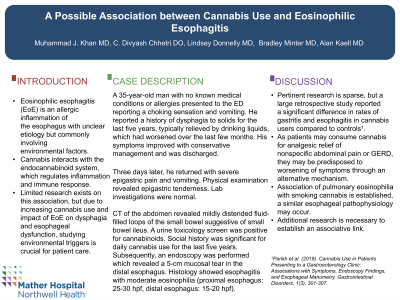Monday Poster Session
Category: Esophagus
P1907 - A Possible Association Between Cannabis Use and Eosinophilic Esophagitis
Monday, October 23, 2023
10:30 AM - 4:15 PM PT
Location: Exhibit Hall

Has Audio

Muhammad Jahanzaib Khan, MD
Mather Hospital/Northwell Health
Port Jefferson, NY
Presenting Author(s)
Muhammad Jahanzaib Khan, MD, C. Divyash Chhetri, DO, Lindsey Donnelly, MD, Minter Bradley, MD, Alan Kaell, MD
Mather Hospital/Northwell Health, Port Jefferson, NY
Introduction: Eosinophilic esophagitis (EoE) is an allergic inflammation of the esophagus with unclear etiology but commonly involving environmental factors. Cannabis interacts with the endocannabinoid system, which regulates inflammation and immune response. Limited research exists on this association, but due to increasing cannabis use and impact of EoE on dysphagia and esophageal dysfunction, studying environmental triggers is crucial for patient care.
Case Description/Methods: A 35-year-old man with no known medical conditions or allergies presented to the ED reporting a choking sensation and vomiting. He reported a history of dysphagia to solids for the last five years, typically relieved by drinking liquids, which had worsened over the last few months. His symptoms improved with conservative management and was discharged.
Three days later, he returned with severe epigastric pain and vomiting. Physical examination revealed epigastric tenderness. Lab investigations were normal. CT of the abdomen revealed mildly distended fluid-filled loops of the small bowel suggestive of small bowel ileus. A urine toxicology screen was positive for cannabinoids. Social history was significant for daily cannabis use for the last five years. Subsequently, an endoscopy was performed which revealed a 5-cm mucosal tear in the distal esophagus. Histology showed esophagitis with moderate eosinophilia (proximal esophagus: 25-30 hpf, distal esophagus: 15-20 hpf).
Discussion: We present a case of worsening dysphagia in a cannabis user diagnosed with EoE. Pertinent research is sparse, but a large retrospective study reported a significant difference in rates of gastritis and esophagitis in cannabis users compared to controls1. The role of eosinophils is important for two reasons. As patients may consume cannabis for analgesic relief of nonspecific abdominal pain or GERD, they may be predisposed to worsening of symptoms through an alternative mechanism. Second, as the association of pulmonary eosinophilia with smoking cannabis is established, a similar esophageal pathophysiology may occur. Additional research is necessary to establish an associative link.
1 Parikh et al. (2019). Cannabis Use in Patients Presenting to a Gastroenterology Clinic: Associations with Symptoms, Endoscopy Findings, and Esophageal Manometry. Gastrointestinal Disorders, 1(3), 301-307.
Disclosures:
Muhammad Jahanzaib Khan, MD, C. Divyash Chhetri, DO, Lindsey Donnelly, MD, Minter Bradley, MD, Alan Kaell, MD. P1907 - A Possible Association Between Cannabis Use and Eosinophilic Esophagitis, ACG 2023 Annual Scientific Meeting Abstracts. Vancouver, BC, Canada: American College of Gastroenterology.
Mather Hospital/Northwell Health, Port Jefferson, NY
Introduction: Eosinophilic esophagitis (EoE) is an allergic inflammation of the esophagus with unclear etiology but commonly involving environmental factors. Cannabis interacts with the endocannabinoid system, which regulates inflammation and immune response. Limited research exists on this association, but due to increasing cannabis use and impact of EoE on dysphagia and esophageal dysfunction, studying environmental triggers is crucial for patient care.
Case Description/Methods: A 35-year-old man with no known medical conditions or allergies presented to the ED reporting a choking sensation and vomiting. He reported a history of dysphagia to solids for the last five years, typically relieved by drinking liquids, which had worsened over the last few months. His symptoms improved with conservative management and was discharged.
Three days later, he returned with severe epigastric pain and vomiting. Physical examination revealed epigastric tenderness. Lab investigations were normal. CT of the abdomen revealed mildly distended fluid-filled loops of the small bowel suggestive of small bowel ileus. A urine toxicology screen was positive for cannabinoids. Social history was significant for daily cannabis use for the last five years. Subsequently, an endoscopy was performed which revealed a 5-cm mucosal tear in the distal esophagus. Histology showed esophagitis with moderate eosinophilia (proximal esophagus: 25-30 hpf, distal esophagus: 15-20 hpf).
Discussion: We present a case of worsening dysphagia in a cannabis user diagnosed with EoE. Pertinent research is sparse, but a large retrospective study reported a significant difference in rates of gastritis and esophagitis in cannabis users compared to controls1. The role of eosinophils is important for two reasons. As patients may consume cannabis for analgesic relief of nonspecific abdominal pain or GERD, they may be predisposed to worsening of symptoms through an alternative mechanism. Second, as the association of pulmonary eosinophilia with smoking cannabis is established, a similar esophageal pathophysiology may occur. Additional research is necessary to establish an associative link.
1 Parikh et al. (2019). Cannabis Use in Patients Presenting to a Gastroenterology Clinic: Associations with Symptoms, Endoscopy Findings, and Esophageal Manometry. Gastrointestinal Disorders, 1(3), 301-307.
Disclosures:
Muhammad Jahanzaib Khan indicated no relevant financial relationships.
C. Divyash Chhetri indicated no relevant financial relationships.
Lindsey Donnelly indicated no relevant financial relationships.
Minter Bradley indicated no relevant financial relationships.
Alan Kaell indicated no relevant financial relationships.
Muhammad Jahanzaib Khan, MD, C. Divyash Chhetri, DO, Lindsey Donnelly, MD, Minter Bradley, MD, Alan Kaell, MD. P1907 - A Possible Association Between Cannabis Use and Eosinophilic Esophagitis, ACG 2023 Annual Scientific Meeting Abstracts. Vancouver, BC, Canada: American College of Gastroenterology.
